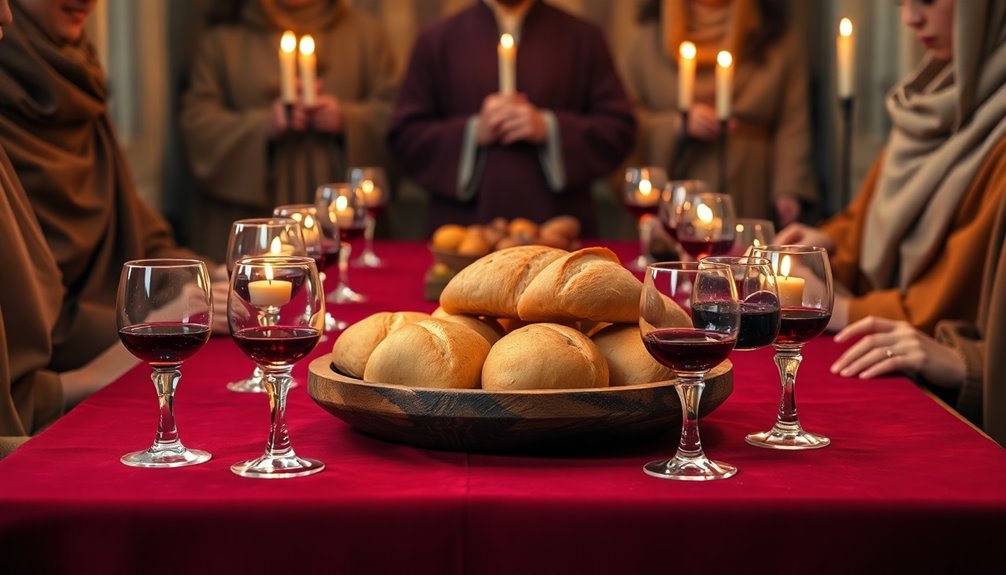The Lord's Supper is a significant sacrament that commemorates Jesus' death and unites believers in faith. During this sacred meal, bread symbolizes Christ's broken body, while wine represents His shed blood. It's rooted in the Passover tradition, celebrating God's deliverance and inviting you to reflect on your own faith journey. This gathering encourages self-examination and strengthens community bonds among believers. It's more than a ritual; it provides spiritual nourishment and a reminder of the promise of eternal life. If you explore the depth of this practice, you'll uncover even more meaning behind the Lord's Supper.
Key Takeaways
- The Lord's Supper commemorates Jesus' death, symbolizing His broken body and shed blood, and establishes the New Covenant for believers.
- It originates from the Passover, emphasizing God's deliverance and the importance of communal unity among believers.
- Self-examination is vital before partaking, ensuring participants approach the meal with a right heart and understanding of their relationships.
- The act of communion fosters spiritual nourishment, reinforcing faith and encouraging growth within the church community.
- Resources like "The Lord's Supper: A Biblical and Theological Study" provide deeper insights into its significance and practice.
Introduction
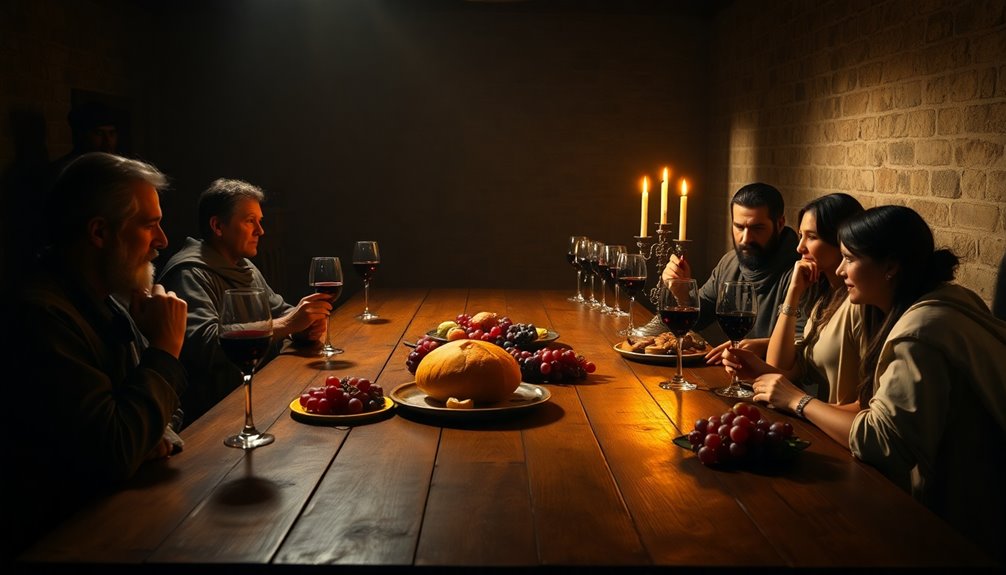
The significance of the Lord's Supper lies in its deep-rooted symbolism and its vital role in Christian worship. Instituted by Jesus during the Last Supper, this sacred practice commemorates His impending death and establishes the New Covenant, connecting believers to the core of their faith. As you partake in this sacrament, the bread represents the broken body of Christ, while the wine symbolizes His shed blood, reminding you of His ultimate sacrifice.
Originating from the Passover meal, the Lord's Supper also celebrates God's deliverance of Israel, linking the past with the present. Different Christian denominations interpret Christ's presence in the Supper in various ways, such as transubstantiation, consubstantiation, and memorialism, adding depth to its understanding.
Participation in Holy Communion is more than a ritual; it requires self-examination and reconciliation among believers. Paul's teachings in 1 Corinthians emphasize that you must approach the table with a pure heart, acknowledging the significance of the death and resurrection of Christ.
This sacred act not only strengthens your faith but also fosters unity within the body of Christ, as you remember and celebrate His gift of salvation.
Scriptural Basis for Communion
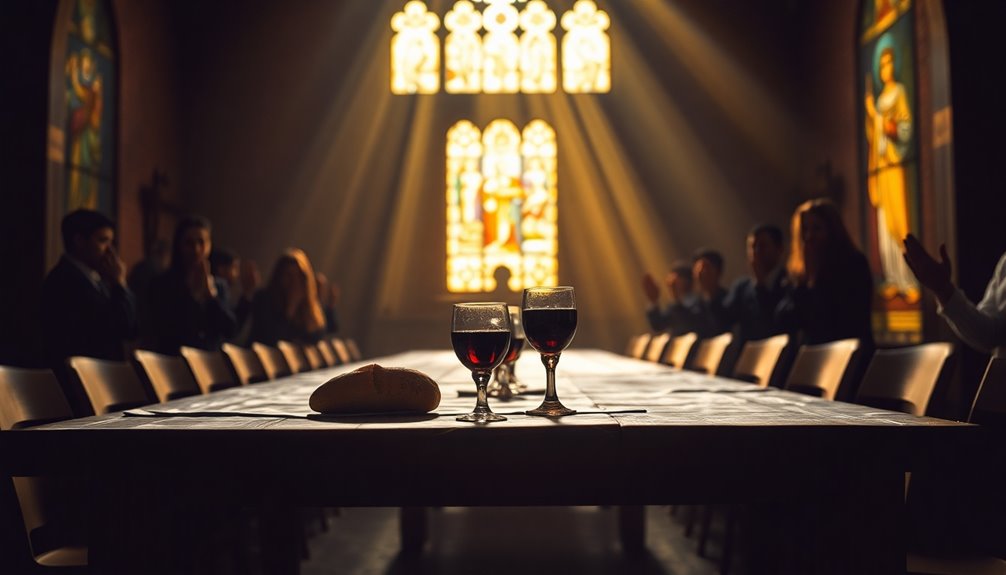
When you think about the Lord's Supper, it's essential to consider the primary and secondary Bible references that shape its significance.
The accounts in the Gospels and Paul's letters provide a clear foundation for understanding this sacred practice.
Let's explore these key scriptures to see how they guide your observance of communion.
Primary Bible References
At the heart of the Lord's Supper are key biblical references that establish its significance for believers. Jesus instituted this sacred act during the Last Supper, as recorded in the Gospels of Matthew, Mark, and Luke. In these passages, He broke bread and shared wine, symbolizing His body and blood, inviting you to engage in communion.
Paul's teachings in 1 Corinthians 11:23-26 highlight the importance of remembrance. You'll find that through the Supper, believers proclaim the Lord's death until His return. This act of remembrance not only honors Jesus' sacrifice but also fosters a sense of fellowship among the Church, uniting you with fellow believers.
The connection to the Old Testament Passover is significant, as seen in Exodus 12. The Israelites commemorated their deliverance, foreshadowing Christ's sacrificial death.
In John 6:53-58, Jesus metaphorically speaks of eating His flesh and drinking His blood, emphasizing the necessity of faith in His sacrifice for eternal life.
Together, these references in the New Testament demonstrate the Lord's Supper as an essential practice, rich in meaning, remembrance, and communal worship.
Secondary Bible References
Numerous secondary Bible references further enrich the understanding of the Lord's Supper and its significance in Christian worship. The accounts of the Last Supper in the Synoptic Gospels reveal that Jesus instituted this sacred meal using bread and wine to symbolize His body and blood.
In 1 Corinthians 11:23-26, Paul emphasizes the importance of remembrance, instructing believers to proclaim the Lord's death until He returns. This highlights the theological depth of the Supper in the early church as a vital expression of faith.
The Old Testament Passover, referenced in Exodus 12, serves as a foundational backdrop, symbolizing God's deliverance and foreshadowing Christ's sacrificial death.
In John 6:53-58, Jesus speaks of eating His flesh and drinking His blood, connecting the Lord's Supper to themes of eternal life and spiritual nourishment.
Furthermore, the practice of breaking bread together in Acts 2:42 illustrates the early church's commitment to communal worship and the observance of the Lord's Supper as central to their faith.
As you reflect on these scriptures, consider the profound significance of approaching the table with reverence, avoiding partaking in an unworthy manner, and embracing the covenant in my blood.
Early Jewish Passover Traditions
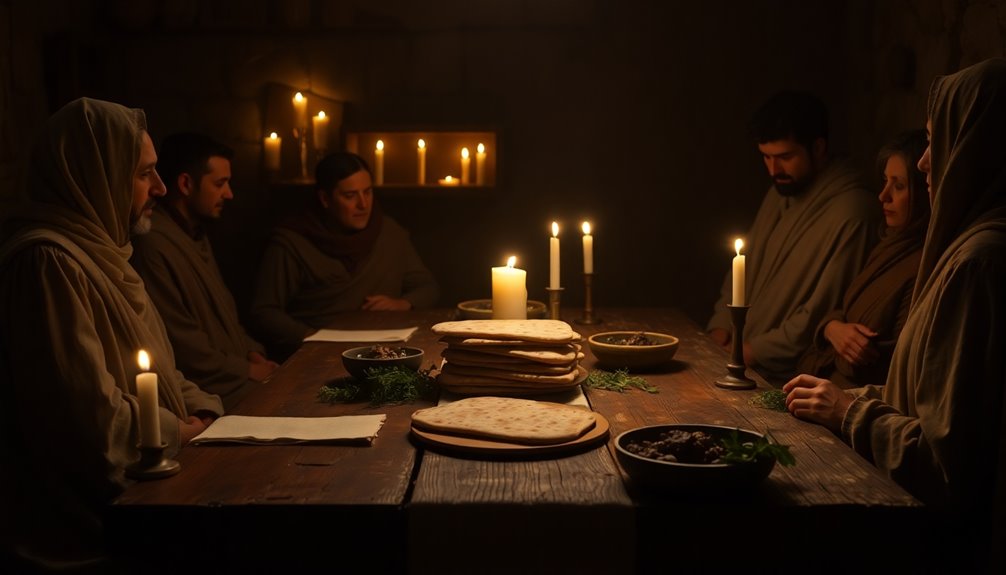
The Passover meal, rich in symbolism and tradition, plays a pivotal role in the Jewish faith as it commemorates the Israelites' liberation from Egyptian bondage. Each year, you participate in this sacred observance, where you gather with your family to retell the Exodus story.
Following the Haggadah, you engage in rituals that highlight the significance of the meal, including the consumption of unleavened bread, wine, and lamb, along with bitter herbs that symbolize the bitterness of slavery.
The lamb, a central figure in the Passover meal, represents not only the sacrifice made for redemption but also the blood marking on the doorposts that protected Hebrew homes during the final plague.
As you sip four cups of wine, each one encapsulates a different aspect of God's promise to His people. These traditions set the stage for the Last Supper, where Jesus reinterpreted the elements of the Passover meal, signifying His body and blood.
In doing so, He foreshadowed His ultimate sacrifice, connecting the ancient rituals to the profound meaning of redemption for all believers.
Symbolism of Bread and Wine
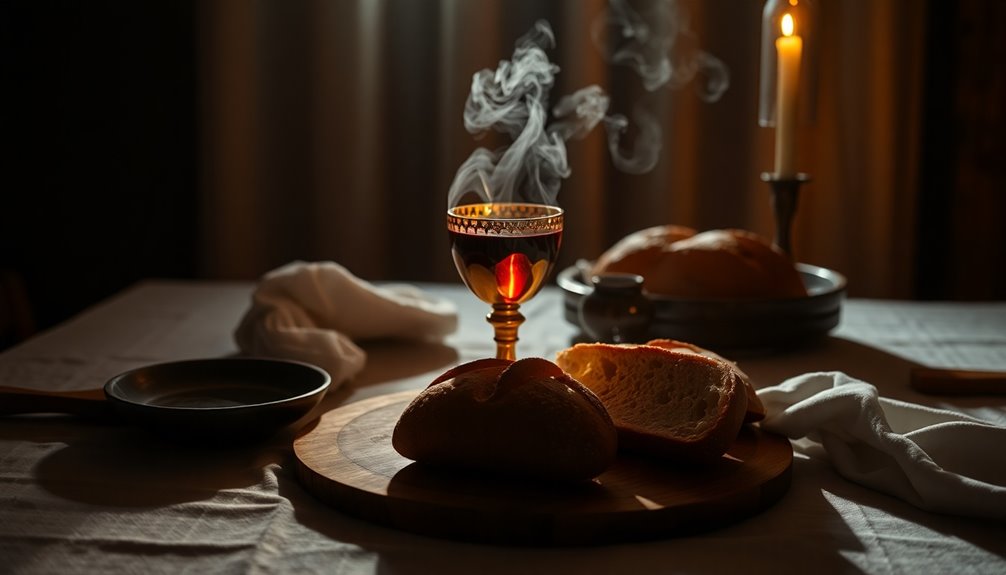
As you partake in the Lord's Supper, the bread and wine take on profound significance, symbolizing Jesus' body and blood given for your salvation. The bread represents Jesus' body, broken for you, while the wine signifies His blood, establishing the New Covenant through His sacrifice. This act serves as a memorial of Jesus, recalling the Passover lamb that offered protection to the Israelites.
When you break bread and share the cup, you participate in a communal meal that unites believers as one body in Christ. This moment invites you to reflect on your spiritual nourishment and the depth of your relationship with Him.
It's essential to approach the Supper with reverence, ensuring that you don't partake in an unworthy manner. Through this sacred observance, you acknowledge the forgiveness of sins made possible by Jesus' sacrifice.
Each element—the bread and wine—reminds you of your faith and the importance of your participation in the body of Christ. As you engage in this ritual, you're not just remembering; you're experiencing the spiritual reality of your faith and the profound love that Jesus has for you.
Misunderstanding Its Historical Context
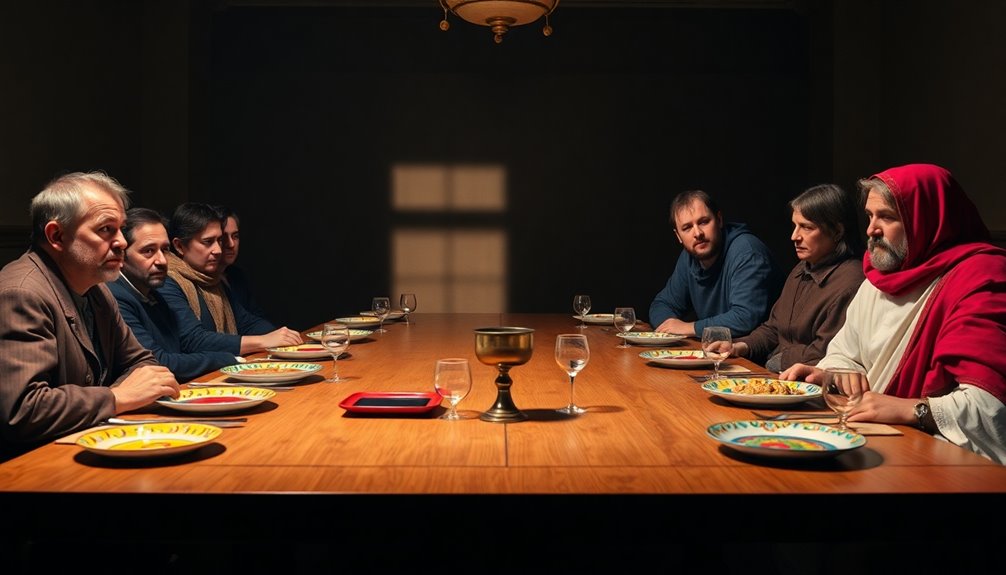
When you consider the Lord's Supper, it's easy to overlook its rich historical context, leading to common misconceptions.
Many misinterpret the sacramental significance of this meal without recognizing its deep roots in Jewish tradition and the transformative message it carries.
Understanding these elements is crucial for grasping the true purpose and power of this sacred practice.
Address Common Misconceptions
Misunderstanding the historical context of the Lord's Supper can lead to significant misconceptions about its meaning and significance. Many see it as a mere Christian ritual, overlooking its deep roots in the Passover celebration and the deliverance of the Israelites from Egypt. The elements of bread and wine symbolize Jesus' sacrifice, connecting to Old Testament prophecies about the Passover lamb, which is often forgotten.
Additionally, it's essential to recognize that the Last Supper was a communal meal, emphasizing fellowship among believers. This aspect is frequently lost in modern interpretations that reduce the Lord's Supper to an isolated act. The political strife and oppression surrounding Jesus' crucifixion also add layers of significance, underscoring His message of peace and redemption amid turmoil.
In the early church, the practice of the Lord's Supper included these communal aspects, highlighting the importance of unity and shared faith. By understanding the historical context, you can appreciate the Lord's Supper not just as a ritual, but as a rich, communal experience that celebrates Jesus' spiritual presence and His ultimate sacrifice.
Recognizing these misconceptions allows for a deeper connection to this sacred tradition.
Misinterpretation of Sacramental Significance
Recognizing the sacramental significance of the Lord's Supper requires understanding its historical context within Jewish tradition. Instituted during the Passover meal, this rite connects to God's deliverance of Israel from Egypt. Misinterpretation often occurs when the symbolic nature of the bread and wine, which represent Christ's broken body and shed blood, is overlooked. Instead of grasping its deeper meaning, some engage in debates over transubstantiation and consubstantiation, focusing on a purely literal understanding.
Many believers miss that the Lord's Supper continues the covenant relationship established through Christ's sacrifice, fulfilling the Old Testament sacrificial system. This misunderstanding diminishes the communal aspect of communion, fostering individualistic interpretations rather than unity among believers. When you partake, remember it's not just a personal act; it's a shared remembrance of Christ's sacrifice.
Furthermore, historical misconceptions linking sacramental practices to superstitions or unworthy participation have contributed to a distorted view of the Lord's Supper. By acknowledging its profound spiritual presence, you can appreciate the true sacramental significance, enhancing your worship experience and understanding of this essential Christian practice.
Reflect on Personal Faith

As you prepare to partake in the Lord's Supper, take a moment to examine your heart and spiritual readiness.
This act isn't just about personal reflection; it also fosters a deep sense of unity within your congregation as you collectively celebrate your faith.
Individual Reflection on Communion
Before participating in the Lord's Supper, taking time for individual reflection is crucial. Engaging in self-examination allows you to approach the table with a right heart and attitude, as emphasized in 1 Corinthians 11:28. This moment of introspection helps you understand the significance of Christ's sacrifice and prepares your spirit to receive it fully.
During this time, consider the implications of salvation in your life. Reflect on your faith journey and how it intertwines with the communal aspect of the Lord's Supper. Acknowledge your relationships with fellow believers, promoting reconciliation and unity within the church body.
It's vital to heed the warning in 1 Corinthians 11:27-29 about partaking in an unworthy manner. This serves as a call for discernment, urging you to approach the Supper with reverence.
Personal prayer during communion can deepen your spiritual connection, allowing you to experience the richness of this sacred moment.
Congregational Unity in Communion
Engaging in individual reflection sets the stage for understanding the deeper significance of congregational unity during the Lord's Supper. When you approach the communion table, you're not just remembering Christ's sacrifice; you're participating in a collective act that emphasizes your shared identity as part of the Body of Christ. This participation calls for self-examination, pushing you to assess your spiritual state and reconcile with God and others before joining your fellow believers.
The act of sharing bread and wine strengthens communal bonds, reminding everyone that you're in this together. Fencing the table ensures that only those in a proper spiritual state partake, fostering accountability within the congregation. This practice isn't just about individual faith; it reinforces the unity that comes from shared beliefs and experiences.
Moreover, as you partake in the Lord's Supper, you're also looking forward to a future banquet in the Kingdom. This hopeful anticipation unites you and your fellow believers in faith and purpose, encouraging a deeper connection to one another.
Ultimately, the Lord's Supper serves as a powerful reminder of both personal and congregational unity in Christ.
Spiritual Nourishment Through Communion
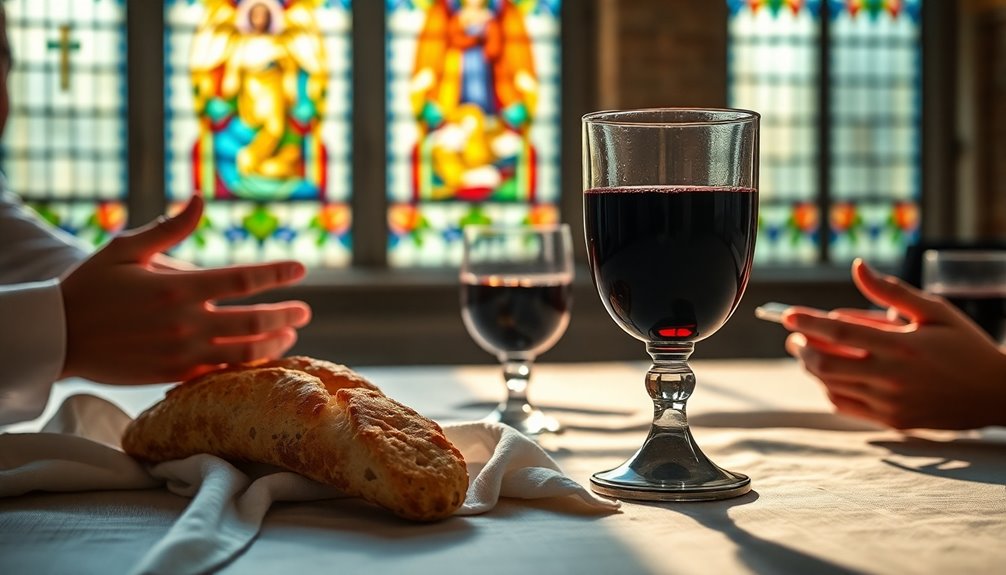
Participating in the Lord's Supper provides essential spiritual nourishment, reminding you of Christ's profound sacrifice and the New Covenant forged through His body and blood. As you engage in communion, you're invited to reflect on your spiritual condition through self-examination, promoting personal growth and a deeper understanding of grace. This moment allows you to confront your shortcomings and embrace the forgiveness offered through Christ's sacrifice.
In this sacred act, you experience a powerful spiritual encounter with Christ, reinforcing your faith and fostering a sense of unity within the church community. The Lord's Supper isn't just a ritual; it's a communal meal that nourishes your spirit and strengthens the bonds among believers. By sharing in this experience, you encourage love and unity, essential elements of your faith journey.
Moreover, participating in the Supper empowers you to proclaim your faith and anticipate Christ's return. This act connects you to the hope and promise of eternal life, reminding you of the immense grace that flows through the New Covenant.
Ultimately, the Lord's Supper serves as a vital source of spiritual nourishment, enriching your walk with Christ and deepening your connection to His body, the church.
Additional Resources
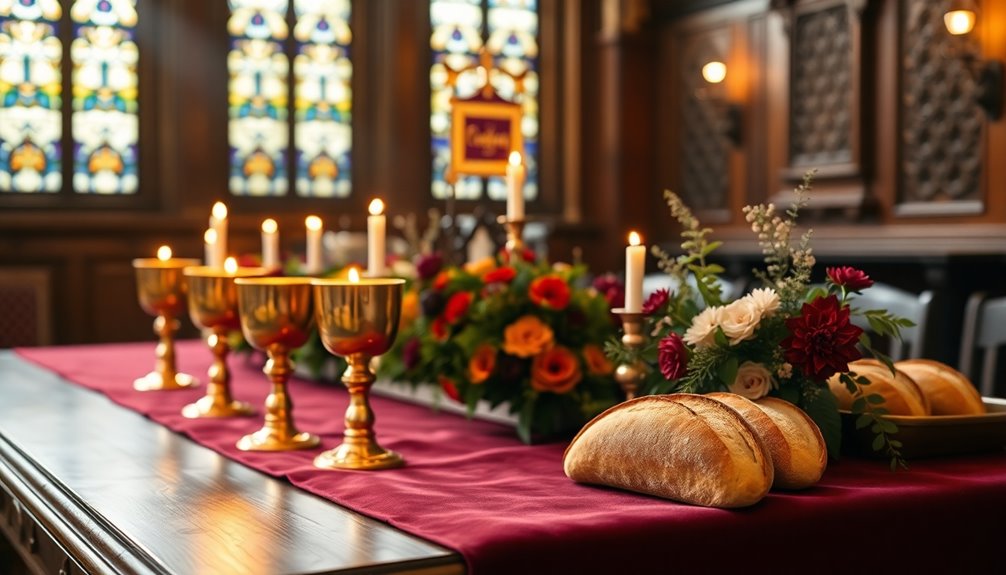
When exploring the significance of the Lord's Supper, you'll find a wealth of resources that deepen your understanding and enhance your experience. For a foundational grasp, consider reading "The Lord's Supper: A Biblical and Theological Study" by David Mathis, which delves into its biblical basis and theological implications.
The "Didache," an early Christian text, provides insight into the practices of the early church, revealing the historical context of communion.
Websites like desiringGod.org feature articles and sermons that explore the Lord's Supper's role in worship and community life, making it easier for you to engage with its theological depths.
Additionally, the book "In Remembrance of Me: A Theological Understanding of the Lord's Supper" offers various denominational perspectives on communion and its scriptural foundations, allowing you to appreciate the diversity within Christian practices.
Lastly, many theological seminaries provide online courses and webinars that cover the Eucharist's biblical basis, liturgical practices, and contemporary applications in worship.
These resources will empower your participation in the Lord's Supper and enrich your faith journey.
Frequently Asked Questions
What Is the True Meaning of the Lord's Supper?
The true meaning of any significant ritual often lies in its ability to create connection and remembrance.
When you participate, you're engaging with a rich tradition that reflects on sacrifice and unity.
It's about self-examination and recognizing the values that bind you to others.
This act invites you to reflect on your own beliefs and the community around you, fostering a sense of gratitude and anticipation for what's to come in your spiritual journey.
Where in the Bible Is the Lord's Supper?
You'll find references to the event in the Gospels, specifically in Matthew 26:26-28, Mark 14:22-24, and Luke 22:19-20.
Each of these passages details a significant moment when Jesus shares bread and wine with His disciples.
Additionally, Paul discusses its importance in 1 Corinthians 11:23-26, emphasizing its role in remembrance.
These scriptures collectively highlight the significance of this practice in Christian faith and its roots in biblical tradition.
What Is the Difference Between the Lord's Supper and Communion?
When you think about the terms "Lord's Supper" and "Communion," they often refer to the same practice but emphasize different aspects.
The "Lord's Supper" focuses on the meal's historical context, while "Communion" highlights the spiritual unity among believers.
Different denominations may prefer one term over the other based on their beliefs.
Ultimately, both terms remind you of the importance of reflection and community during this significant act.
What Are the Three Requirements for Receiving Holy Communion?
To receive Holy Communion, you need to meet three key requirements.
First, you must have faith in Jesus Christ as your Lord and Savior, believing in His sacrificial death and resurrection.
Next, self-examination is vital; reflect on your spiritual state and ensure you're not living in unrepentant sin.
Lastly, reconciliation with others is crucial, as communion symbolizes unity, requiring harmony within your community.
Make sure you're in a state of grace too.

